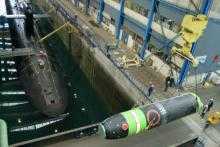No more weapons to the Middle East
Wendela de Vries describes the action Stop Wapenhandel took against the presence of Dutch companies at the IDEX arms fair.
From an arms trade perspective, the Middle East is full of opportunities. In December 2014, the Dutch lobby organisation for defence industry NIDV announced participation in the Abu Dhabi IDEX arms fair, the biggest arms fair in the Middle East and one of the biggest in the world. The bi-annual IDEX welcomes land, air and sea forces. Although it is called the International Defence Exhibition and conference, the purpose of the event is of course to sell arms, notably to countries in the Gulf region.
Participating in IDEX were Dutch companies in the 'Holland Pavilion' (situated nicely between the Turkish arms industry on one side, and the Russians on the other), some individual big companies and also trade officials from three Dutch ministries. Last but not least, the charming Dutch Minister of Defence herself had a meeting with the host of the fair, his highness sheikh Khalifa Bin Zayed Al Nahyan. It was definitely a strong delegation, which was aiming to promote Dutch products to military forces of countries which play at least a questionable role in aggravating the violence in the Middle East.
As soon as the trip became known, Stop Wapenhandel ('Stop Arms Trade') started a signature campaign to call on the minister to cancel this arms trade mission. It was actually a simple campaign; the main activity was collecting signatures and distributing information about the role of western arms in the Gulf region. We also described the Dutch companies involved, information broadly picked up by local press. In several local newspapers debate arose about the nature of these producers. The Dutch defence industry mainly consists of hi-tech component producers which also sell on the civil market, and only a few big, primarily military, companies. The component producers told journalists that they did not make weapons, only very sophisticated technological products, like cooling systems for navy ships (designed to cool the ship's rocket launch systems – something they didn't tell journalists, but we did!) Other producers told journalists that they only sold 'defensive weapons' like armour - a nonsense category from a military perspective, with better armour it is more easy to launch an attack.
The campaign appealed to a strong feeling of unease within the Dutch society about military deliveries to the Middle East (our government also sends only 'non-lethal military goods' or 'defensive weapons' and many people are not so sure that they end up in good hands – mainly because there are few good hands on the fighting side) and about the wrong allies we have chosen in the region. Most people believe that more arms will only make things worse.
Picketline at Airbus shareholders meeting, May 27 in Amsterdam
On Wednesday May 27, Stop Wapenhandel will organise a picket line at the Airbus annual shareholders meeting in Amsterdam. Join us with your banners and peace flags, from 12.00 to 14.00 uur, Ferdinand Bolstraat 333 Amsterdam (in front of Okura Hotel).
Airbus is one of the bigest military companies in Europe. In 2000, the company was formed by a merger of Aerospatiale Matra from France, DASA from germany and CASA from Spain. The Netherlands were selected as a 'neutral' place for registration, with the additional advantage that the Netherlands tax law is very kind to international companies.
In 2014, the company again made huge profits on arms production, although civil production (notably the Airbus passengers plane) was growing even vaster. The right moment, according to Stop Wapenhandel, to switch over to civil production completely.
Airbus is responsible for the French ballistic nuclear missile M51 for use in submarines (see picture). It has also been participating in the production of the new French ASMPA nucleair missile for the French air force.
Airbus also makes military transport planes (A400M), participates in production of fighter jets (Typhoon), and military helicopters. The company is planning further development of military drones and it has a loud voice in the lobby for mor EU defence industry subsidy.


Add new comment